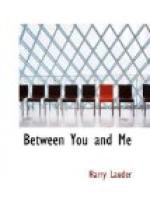“The future’s yours, now, Harry, my boy,” he said. “Wait—and you can get what you please from them. And then—there’s America to think about.”
I laughed at him when he said that. My mind had not carried me sae far as America yet. It seemed a strange thing, and a ridiculous one, that he who’d been a miner digging coal for fifteen shillings a week not so lang syne, should be talking about making a journey of three thousand miles to sing a few wee songs to folk who had never heard of him. And, indeed, it was a far cry frae those early times in London to my American tours. I had much to do before it was time for me to be thinking seriously of that.
For a time, soon after my appearance at Gatti’s, I lived in London. A man can be busy for six months in the London halls, and singing every nicht at more than one. There is a great ring of them, all about the city. London is different frae New York or any great American city in that. There is a central district in which maist of the first class theatres are to be found, just like what is called Broadway in New York. But the music halls—they’re vaudeville theatres in New York, o’ coorse—are all aboot London.
Folk there like to gae to a show o’ a nicht wi’oot travelling sae far frae hame after dinner. And in London the distances are verra great, for the city’s spread oot much further than New York, for example. In London there are mair wee hooses; folk don’t live in apartments and flats as much as they do in New York. So it’s a pleasant thing for your Londoner that he can step aroond the corner any nicht and find a music hall. There are half a dozen in the East End; there are more in Kensington, and out Brixton way. There’s one in Notting Hill, and Bayswater, and Fulham—aye, there a’ ower the shop.
And it’s an interesting thing, the way ye come to learn the sort o’ thing each audience likes. I never grow tired of London music-hall audiences. A song that makes a great hit in one will get just the tamest sort of a hand in another. You get to know the folk in each hoose when you’ve played one or twa engagements in it; they’re your friends. It’s like having a new hame everywhere you go.
In one hoose you’ll find the Jews. And in another there’ll be a lot o’ navvies in the gallery. Sometimes they’ll be rough customers in the gallery of a London music hall. They’re no respecters of reputations. If they like you you can do nae wrong; if they don’t, God help you! I’ve seen artists who’d won a great name on the legitimate stage booed in the halls; I’ve been sorry for mair than one o’ the puir bodies.
You maun never be stuck up if you’d mak’ friends and a success in the London halls. You maun remember always that it’s the audience you’re facing can make you or break you. And, another thing. It’s a fatal mistake to think that because you’ve made a success once you’re made for life. You are—if you keep on giving the audience what you’ve made it like once. But you maun do your best, nicht after nicht, or they’ll soon ken the difference—and they’ll let you know they ken it, too.




